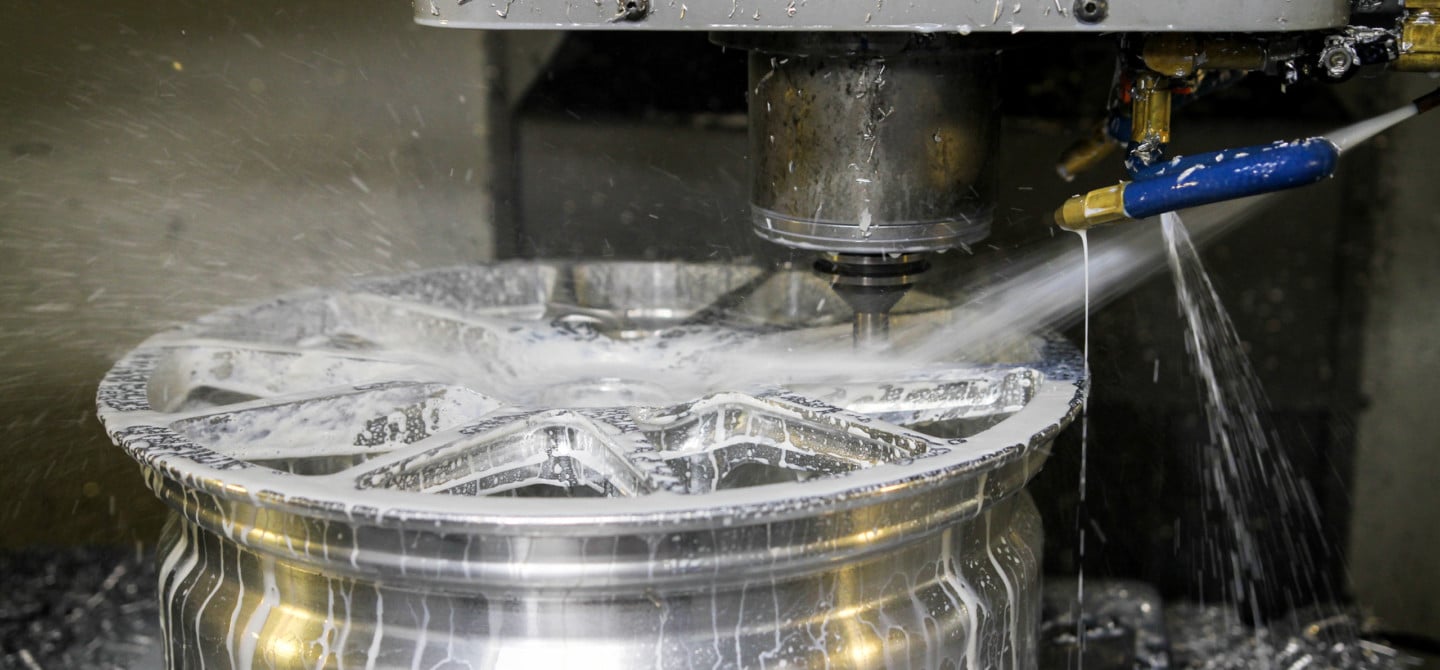It may sound absurdly obvious but it is pretty tough to enjoy an automobile if said automobile doesn’t have wheels on it. Simply stated the possession of wheels is not optional when it comes to cars. Cars just don’t move around very well without wheels. You do still have some options though, as in “What type of wheels do you want?” If you answered “round wheels” you are on the right track. However, there are more specific questions when it comes to wheel choices. What are you going to do with your car? Race it? Put larger brakes on it? Show it and occasionally take it to a track day? Go to the store to pick up groceries? We are going to examine the differences between cast, flow formed and forged wheels.
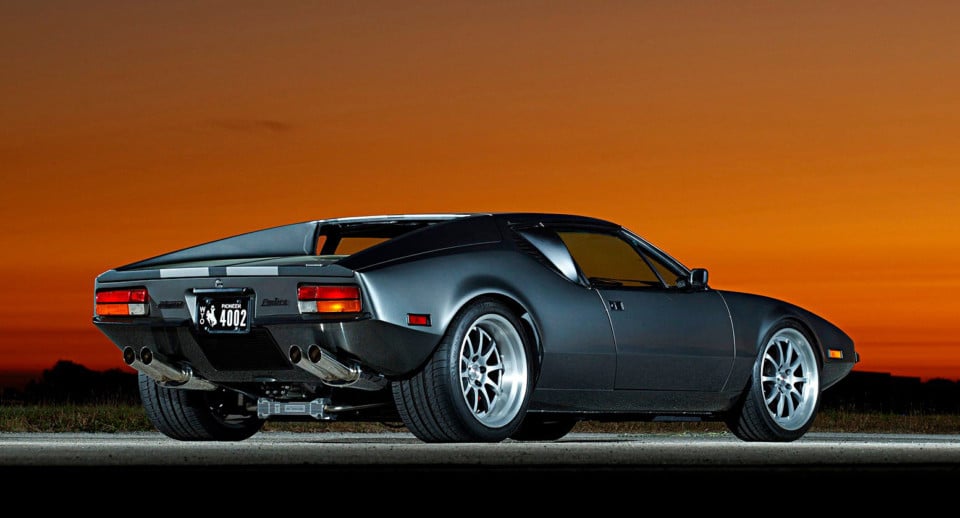
These forged Performance Series ZX3 wheels from Forgeline can do double duty of looking great at a car show and being strong and light at the track.
If all you want to do is drive to the store to pick up beer then save yourself some money and get some stamped steel wheels with plastic hub caps. But, if you have a performance oriented vehicle then you will quickly want to move beyond the stamped steel wheel option and get some alloy wheels. Alloy wheels are lighter than steel (which means less rotating mass) and do a much better job of dissipating heat from brakes. But, not all alloy wheels are created equally. Depending on how the wheel was manufactured can determine how light the wheel is and how strong it is.
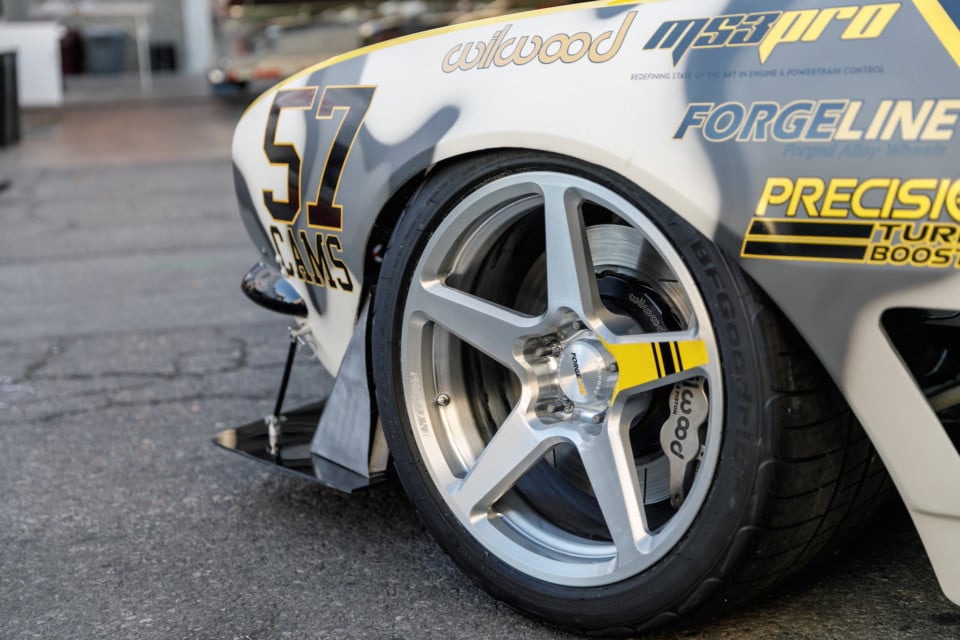
This Forgeline CF1 Open Lug 18 X 12.5 wheel was on Mike Dusold’s 1967 Camaro when he won the 2019 Optima Search for the Ultimate Street Car Invitational in Las Vegas. To handle the forces applied to this wheel on a heavy car like a 1967 Camaro it was important this wheel was forged.
Alloy wheels are commonly manufactured through three different processes: Cast, Flow Formed, and Forged. We will go through how each of the manufacturing processes is conducted and some of the pros and cons of each finalized wheel.
CAST WHEELS
Casting aluminum wheels is the most common manufacturing process for alloy wheels on the market. How these wheels are made is molten aluminum is poured (or drawn in with a vacuum) into a mold which forms the material into the desired wheel shape. The aluminum cools and then it is machined, drilled and trimmed into the final wheel. This processing of casting a wheel is easy and less expensive than other methods however the process of allowing the molten aluminum to solidify can lead to porosity. Porosity is inconsistencies in the material structure which can lead to cracking and the overall reduction in the wheel’s integrity. Because of porosity, in order to ensure a cast wheel can be stronger manufacturers have to use more material which leads to heavier wheels.
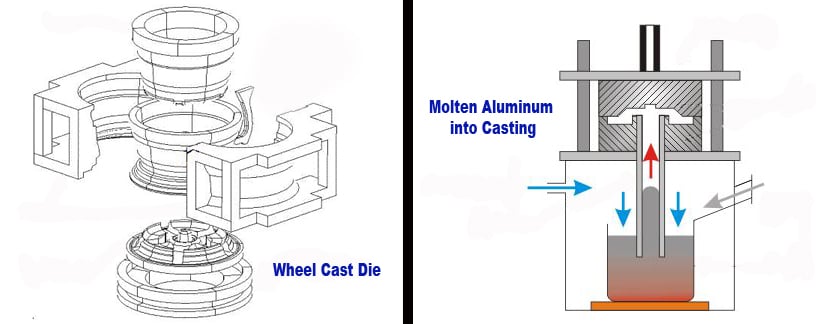
On the left is a diagram of an alloy wheel cast die. The diagram on the right displays how molten aluminum is fed into the die prior to cooling.
The advantage of a cast wheel is they are relatively inexpensive. The disadvantage of a cast wheel is their failure point. Cast wheels tend to crack under stress and have spectacular failures on track. The porosity of the alloy allows for opportunities for the casting to break away. This is a bad thing when you are driving and can cause a lot of damage, not just to the wheel but to the rest of the car or even worse, it can cause a collision that will damage you.
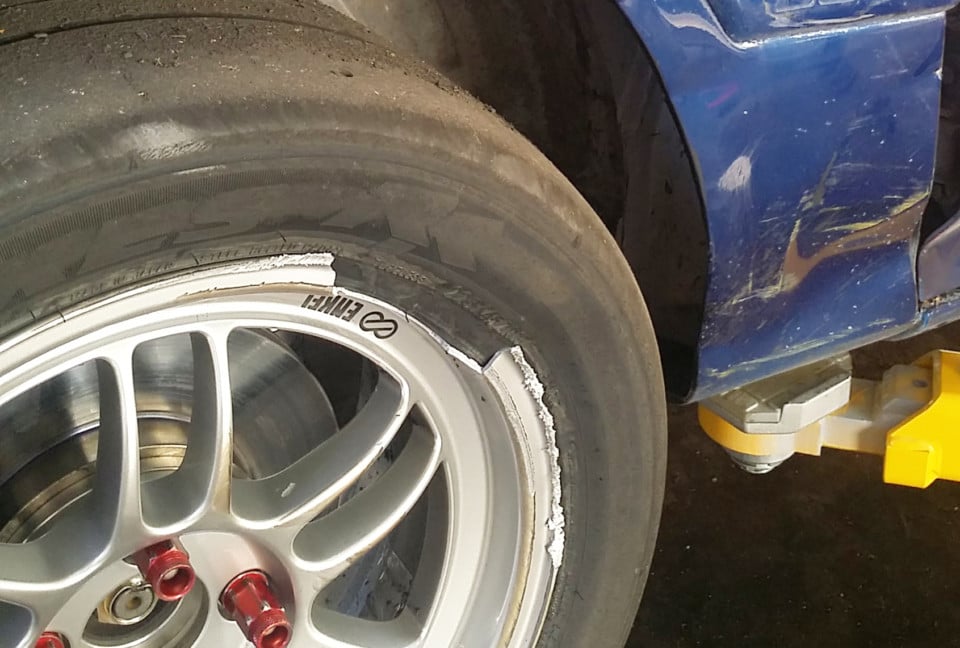
Some very minor wheel to wheel contact during a Honda Challenge race caused this wheel to crack. A forged wheel would not have cracked, but would have been left unscathed or slightly bent.
Cast wheels are designed for a lower load rating and are built to have 500 treadwear tires on them. If you put a slick tire on a cast wheel (or even a 200 treadwear tire, like used in Optima Search For the Ultimate Street Car) with a heavy car you can actually break a cast wheel. Buyer beware.
CAST WHEEL PROS: Inexpensive, better than stamped steel wheels, readily available.
CAST WHEEL CONS: Brittle, prone to cracking and failure, have to use more material to maintain strength (heavier than alternatives -flow formed or forged).
CAST WHEEL ON O.E.M. VEHICLES: Your mom’s Honda Civic with all-weather passenger car tires
WHO LOVES THEM: Car show folks
You get what you pay for and cast wheels are inexpensive, however, they really don’t have the strength needed for serious performance driving with sticky tires. For those who want more strength in a wheel that is also lighter and don’t want to spend too much money there are flow formed wheels.
FLOW FORMED WHEELS
An upgrade to cast wheels is a process called Flow Forming. This methodology is also referred to as Flow Forged or Forged Hybrid. The reality is there is nothing forged about these wheels. The name Flow Forged is really a misnomer and shouldn’t be used (but is often used by marketers who want to convey a sense of strength in a wheel). But, Flow Forming, regardless if it isn’t forged, does have its own advantages to increase strength in the aluminum. This process allows wheel manufactures to use less material and thus can create a lighter wheel.
The process to flow form a wheel is the wheel is cast, just like any other cast wheel, however the die for the barrel portion of the wheel is narrower than the final wheel will actually be. Once the cast is made the unfinished wheel is placed on a machine where the wheel is heated to over 400 degrees and then spun. A spinning disc contacts the wheel and widens the barrel of the wheel forming the final shape and width of the wheel. This process of heat and pressure helps strengthen the aluminum in the barrel portion of the wheel.
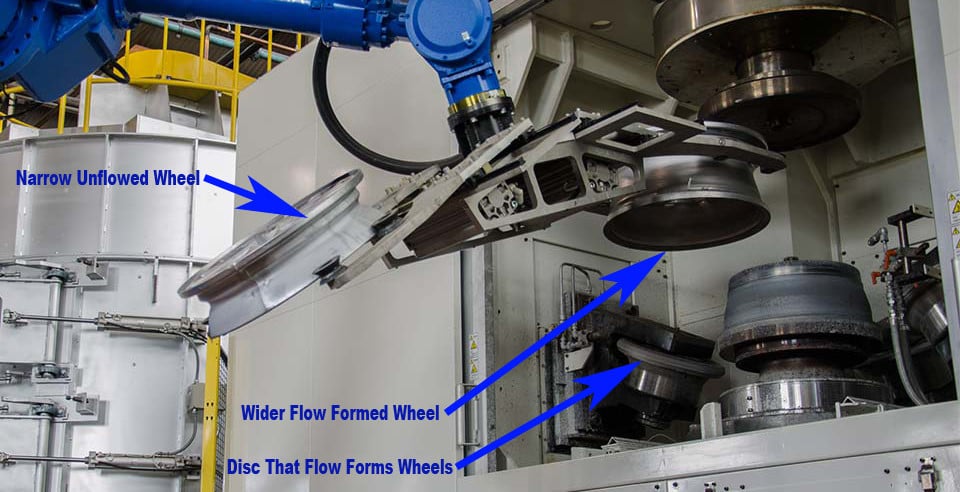
This machine flow forms wheels. The cast wheels start out narrow and then spinning discs pull the material down making the barrel of the wheel wider. This process strengthens the barrel of the wheel but does nothing for the cast center.
The flow forming process can create some very lightweight wheels. Racers who compete in small cars like Spec Miata or Honda Challenge use these wheels for their advantage with reducing rotating mass. Less rotating mass helps with acceleration and breaking efficiency. There is some risk involved with flow formed wheels because with all of their lightness comes some issues with failures. The center of the wheel is still cast (with granular aluminum) and thus still has porosity in it which makes the hub section of the wheel brittle.
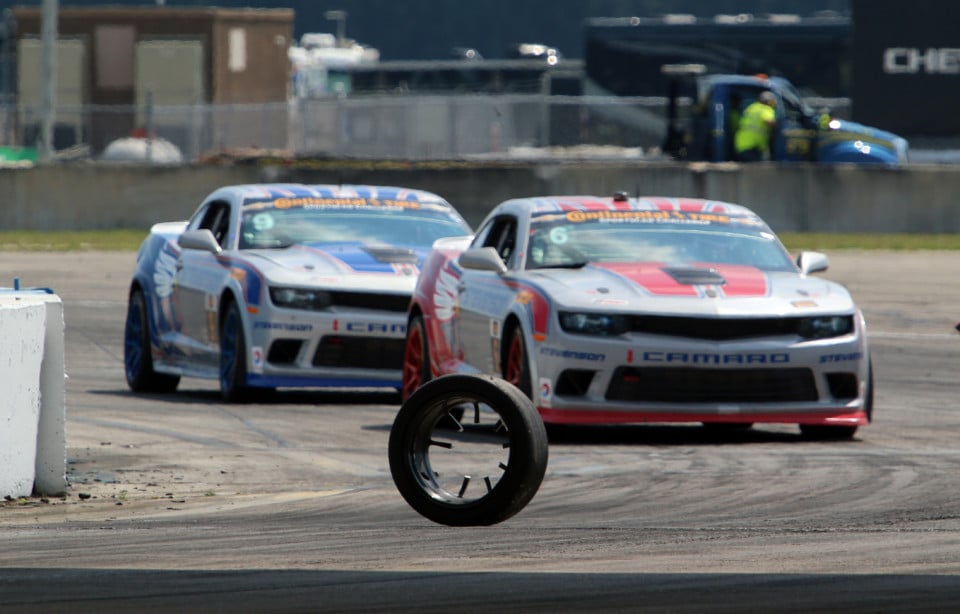
Flow formed wheels are an improvement over cast wheels, however, the center of the wheel is still cast and thus they are prone to failures. This wheel cracked the entire hub section out and ruined a driver’s race. A forged wheel would not fail this way.
The trick to ensuring a set of flow formed wheels are good enough to use for performance driving with sticky tires is the load rating for the wheel. If you don’t see a load rating listed, or it isn’t stamped on the wheel, you probably shouldn’t use these wheels for racing. You need to ensure your vehicle and your tires do not go beyond the load rating capacity of the wheel.
FLOW FORMED WHEEL PROS: Lighter than cast wheels, less expensive than forged wheels.
FLOW FORMED WHEEL CONS: Center of wheels is still cast so it is prone to failures.
FLOW FORMED WHEEL ON O.E.M. VEHICLES: Porsche GT4
WHO LOVES THEM: Autocrossers and Spec Miata Racers
For people who need a wheel that is stronger than a cast wheel and also stronger than a flow formed wheel there is a solution: forged wheels.
FORGED WHEELS
Forged wheels are strong and they are light, but those amenities come with a price. The fact is forged wheels are expensive. When you see how these wheels are made and how much material is used it makes sense why these wheels fetch such a high price. Steve Schardt of Forgeline Wheels provided some insight on how their forged wheels are made. “When we are forging we start with a bunch of 6061 aluminum,” said Steve. “We forge it to gain grain flow, which means we can use 30-35 percent less material, which is where we save weight.” Forgeline wheels start with one piece monoblock and are forged for strength.
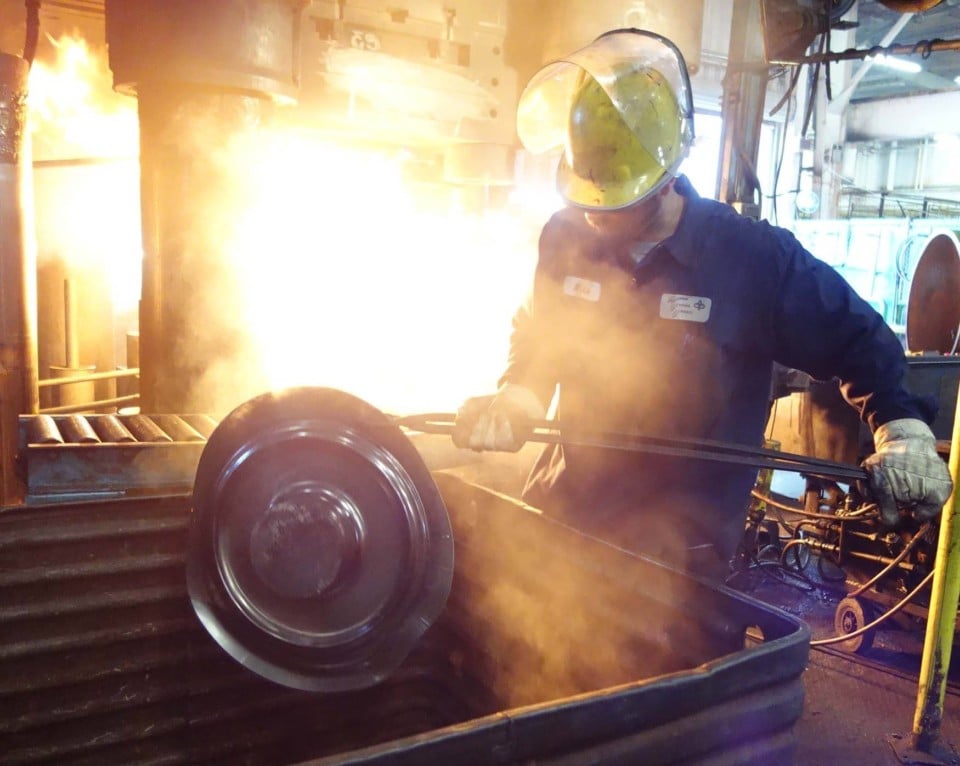
The forging process involves heat, lots of heat, and smashing metal to get the grain of the 6061 aluminum just right for tons of strength.
After the forging process Forgeline puts the wheel blank in a lathe and begins turning. The wheel starts at about 100 pounds, then they turn it and get it down to 45-50 pounds. Then they put it in a Computer Numerical Control (CNC) mill and they get it down to about 19.5 pounds for an 18 inch wheel. A lot of forged material is cut away to leave behind the strong wheel.
This process creates a wheel which is lightweight but has a high load rating. The load rating for each Forgeline racing wheel is at 2,100 pounds. Why load rating is important is due to the forces acting on the wheel depending on the tires used. For example if you had a wheel rated at 1,000 pounds and put on a 200 treadwear tire, then that wheel is really only good for about 800 pounds. If you put a Hoosier tire on that wheel it would only be good for about 700 pounds. This is problem when you have four wheels (700 pounds x 4 = 2,800 pounds) on a car that weighs 3,500 pounds. With Forgeline wheels rated at 2,100 pounds each they can handle the stickiest tires on the market.
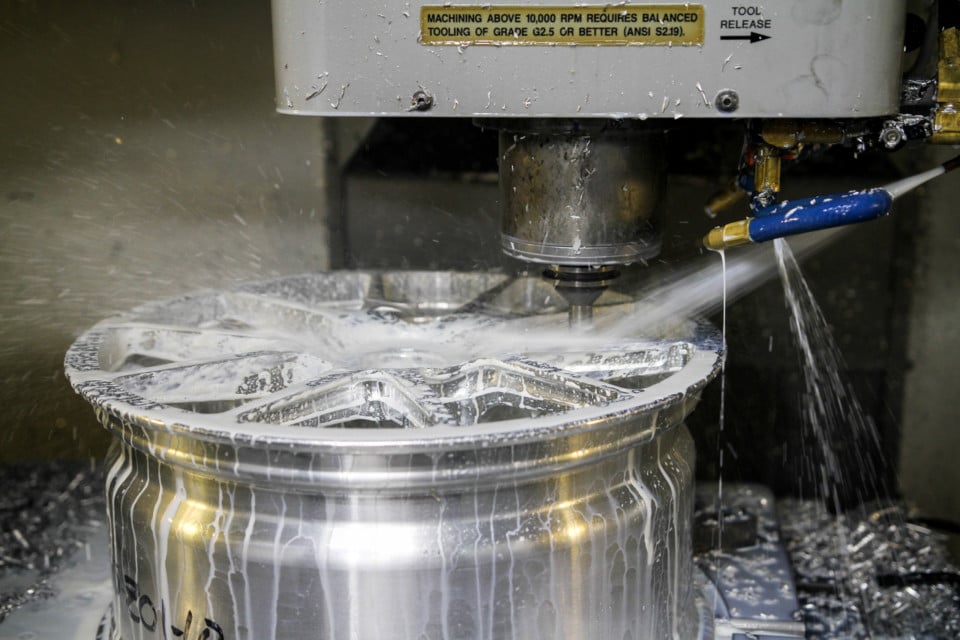
Once a Forgeline wheel has gone through the forging process then it is time to start machining away aluminum to get the wheel as light as possible. Starting with 100 pounds of forged 6061 aluminum this Forgeline GA1R wheel will be turned and CNC milled down to 19.5 pounds.
The forging process which creates the high load rating helps the wheel during an impact. If a Forgeline wheel strikes a wall it will bend. This is different from a cast or flow formed wheel which has granular aluminum so if they hit a wall they will break -which means their failure mode is catastrophic.
Even though a forged wheel is stronger it is still a wearable item. Wheels don’t last forever. Wheels are designed with a triangle concept: weight, strength and longevity. According to Steve Schardt, “I can make a wheel strong and heavy to last forever. Or I can make a lighter wheel that is not as strong but it will only last three years. You have to consider that trade off for any wheel. These are fatigued items, it doesn’t matter if a wheel is cast, flow formed or forged, in racing they will all fail eventually.”
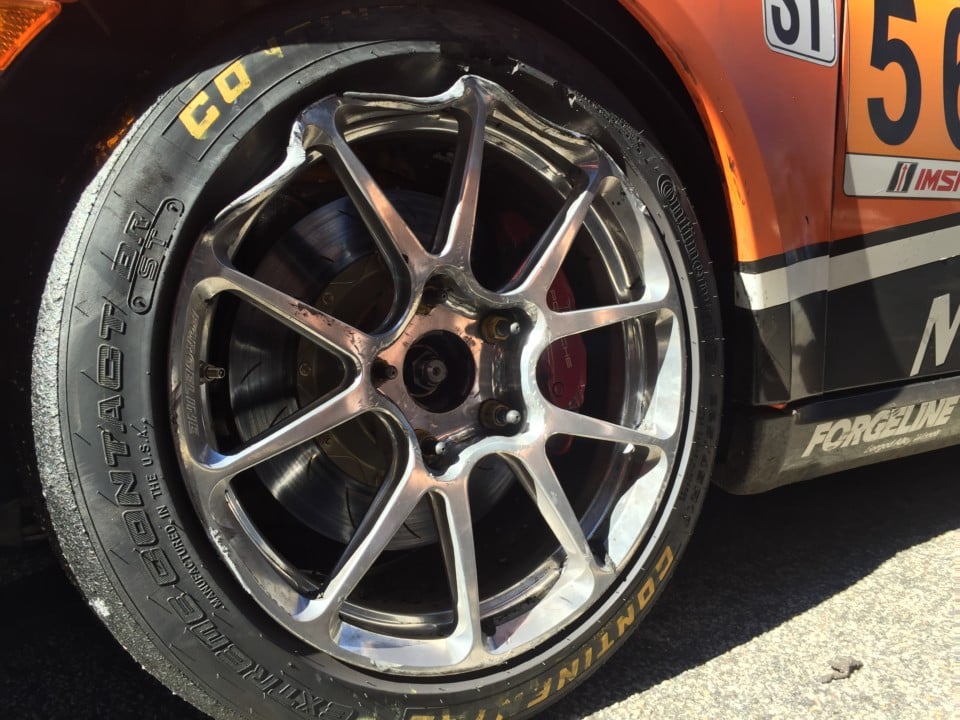
This Forgeline forged wheel took a big hit during a IMSA Continental race and it is certainly damaged, however, notice that the tire still has air in it and the wheel is still attached to the hub. If this was a cast wheel or a form flowed wheel it would have cracked causing tire pressure loss or the complete loss of wheel from the car.
Understanding that wheels are wearable items, Steve has advice to racers, “Keep inspecting your wheels, look at the back of the wheel, especially near the hub for hairline cracks.” Even though we have established forged wheels are stronger those wheels aren’t available to everyone. The smallest diameter wheels which Forgeline makes are 17 inches. The market for Forgeline is the larger faster more powerful machines, like the Ford Mustang GT4 race car, a pro-touring Optima Ultimate Street Car Challenge 1969 Camaro, or a Porsche GT3. Smaller lighter cars do not need the same high load rating that Forgeline wheels provide and can use a cast wheel. However, the failure point on a cast wheel can still reach out to bite a racer.
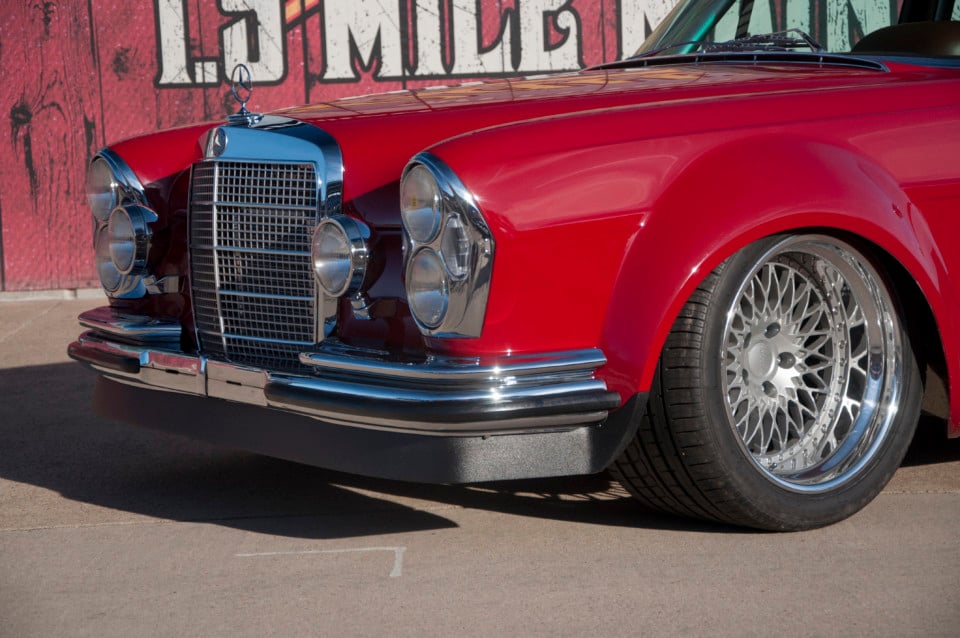
These deep dish front wheels on Josh Stahl’s award winning, LS equipped, “Red Pig” Mercedes are 18×11 Forgeline LS3 wheels finished with silver centers and polished outers. This car is big and heavy and has lots of power requiring a strong forged wheel for track duty.
Steve talked about the importance of lightweight wheels, “To make a car ride better and handle better a lighter wheel can really make a difference. Not only are Forgeline wheels stronger, they are lighter too. For example our forged wheels for the C7 Corvette are lighter than the O.E.M. wheel. Our wheels are a marked improvement to that car.”
FORGED WHEEL PROS: Strong, light, not prone to failures, maximization of design options due to material strength
FORGED WHEEL CONS: Expensive, not available in every size (smaller wheels)
FORGED WHEEL ON O.E.M. VEHICLES: Porsche GT3
WHO LOVES THEM: Professional racing teams, Optima Search for the Ultimate Street Car crowd
CHOICES
Cast, flow formed or forged, you have your options when it comes to wheels for your car. Vehicle weight, tire treadwear rating and use (autocross, road racing) will help you determine what wheel is the best for your hot rod. Steve Schardt, who makes a living selling forged wheels for Forgeline admits, “There are a ton of Miatas out there racing on cast aluminum wheels, which is actually okay because they don’t weigh very much. With a 15 X 7, 13 pound, cast aluminum wheel, it is a great wheel and it works for them because of the low weight. Those racers just need to continue to inspect their wheels and look for cracks because wheels don’t last forever. For a Pro-Turing, Optima car, a big car like a Camaro using a slick tire, that is a different story. They need a stronger wheel, like a forged wheel, to ensure they don’t have a failure with their heavier car.”


